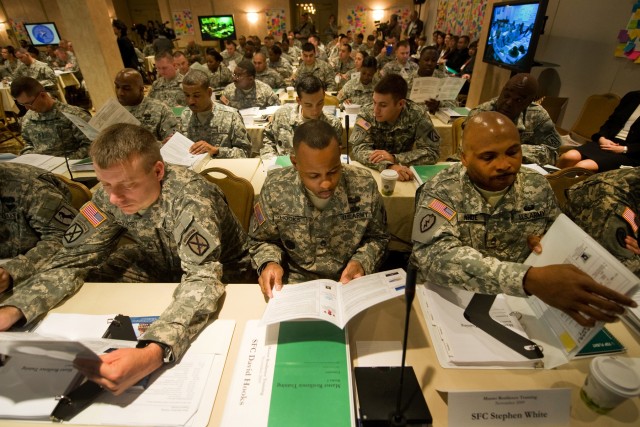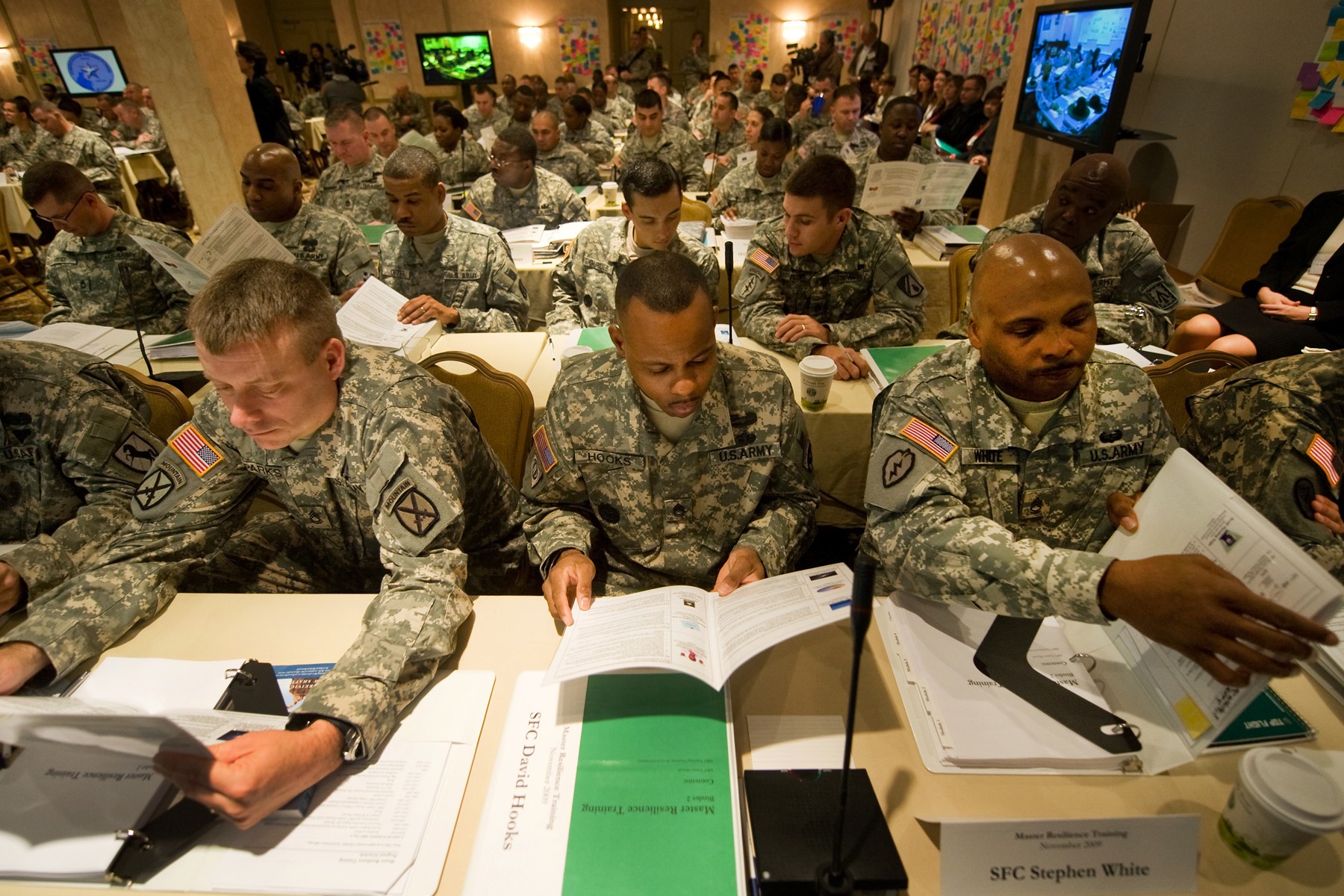
HEIDELBERG, Germany -- Units have their master gunners, master drivers and master fitness trainers. These experts are the best at what they do and they share their expertise with their fellow Soldiers.
By next October, each U.S. Army Europe brigade and battalion-level unit will have a new type of master assigned to its ranks -- a Master Resiliency Trainer. MRTs will serve as their units' experts in building mental, physical and spiritual health as part of the Army's Comprehensive Soldier Fitness program, said MRT program manager Jessie Massey, USAREUR's deputy chief of medical operations.
In the meantime, seven USAREUR members -- Massey, four senior NCOs and two senior family members -- will graduate from the MRT certification course at the University of Pennsylvania Nov. 19 to become the command's first resiliency experts.
"Eventually, we will have an MRT in every unit down to company level. We are working with Installation Management Command and Army Community Service to get the training down to the Family Readiness Group level," Massey said.
Each MRT works for and reports to his or her unit commander, he said. At the brigade level, MRT duty is a full-time position, similar to the unit's equal opportunity advisor. At lower echelons, the position will be assigned as an additional duty.
The USAREUR surgeon's office will oversee the unit programs, ensuring they receive the resources do their jobs, as well as make the MRT program available to family members and civilian employees, Massey added. They will also work with other USAREUR staff agencies to measure the effectiveness of the program.
He stressed that the MRT NCOs are not counselors or health care providers. As one of the person-to-person facets of the Army's Comprehensive Soldier Fitness program, they will be able to talk with Soldiers as part of their unit's resiliency training program.
The Army's CSF program is designed to build resilience in all members of the Army community -- Soldiers, Family members and civilian employees -- by developing five dimensions of strength: physical, emotional, social, spiritual and family.
"This is one of the first programs that targets what is already OK and (makes) it better," Massey said. "Many of our current programs target a segment of our population that has previously been identified with a problem. This program looks at the whole person, with the goal to improve performance."
"The Army has realized total fitness is much more than just physical fitness. It's about total wellness and fitness, building strength and resiliency in our Soldiers, Families, civilians and retirees," said Col. Jeffrey Dill, U.S. Army Garrison Wiesbaden commander, in the Oct. 8, 2009 edition of the Herald-Union newspaper. "The simple message is (that) everyone benefits from it. It's about our health and well-being, building our inner strength and our resiliency, our ability to deal with hard times."
The first USAREUR unit MRTs -- Master Sgt. Marvin Henley of 1st Armored Division; Sgt. 1st Class David Hooks of 21st Theater Sustainment Command; Sgt. 1st Class Michael Bradley of 2nd Stryker Cavalry Regiment; and Sgt. 1st Class Daniel Stoner of 18th Military Police Brigade -- will design, implement and sustain their units' resiliency training programs, Massey said.
"The goal is to institutionalize the program so that is becomes a way of life for the Total Army," he explained, noting that new Soldiers will undergo CSF training in basic training and advanced individual training.
One of the primary tools the Army has designed to help the MRTs measure resiliency is the Global Assessment Tool, a survey that looks at each individual's strengths or weaknesses in four of the program's five focus areas:
Aca,!Ac Emotional: being able to deal with life's challenges positively and optimistically with self-control, stamina and good character.
Aca,!Ac Social: building and sustaining relationships with friends that are personally fulfilling and include good communication.
Aca,!Ac Spiritual: building sets of beliefs, principles or values.
Aca,!Ac Family: being a member of a supportive and loving family living in a safe, healthy and secure environment.
The survey was created by experts from the U.S. military and civilian universities. CSF program officials say it is not a diagnostic tool, but rather a way for a person to visualize performance growth based on changes in training, experience and maturity. The Army course was adapted from a civilian program designed for teachers that was reworked to meet the experiences and needs of the military community.
Once the GAT is completed, each taker receives an immediate confidential online assessment of his or her strengths or weaknesses in each of the four areas. Alongside the assessment scale are links to training modules that offer strategies and tools for further self-assessment and positive approaches to situations that can challenge resiliency and well-being.
CSF program officials say Soldiers will take the 175-question online several times over the course of their careers to chart their resiliency and progress. Unit leaders will be able to view their unit's overall strengths, but will not be able to see an individual Soldier's assessment, nor use the results as criteria in selecting Soldiers for promotion, command assignments or schooling.
Soldiers are required to take the survey. Civilian employees and family members will be given an opportunity to complete the survey as the program develops.
"Being 'Army Strong' is more than just being physically fit," said Brig. Gen. Rhonda Cornum, the Army's CSF program director. "We're not just preparing Soldiers for the battlefield. We're preparing them for life. We're changing the culture of the Army with this program by training to enhance psychological health and fitness as we have always done with physical health. We are elevating mental fitness to the same level where we have held physical fitness."
For more information about the Army's CSF program, go to www.Army.mil/csf.
Additional articles on the current MRT course are available through the Army News Service.
Daily blog entries from MRT students are available at Army Live.

Social Sharing